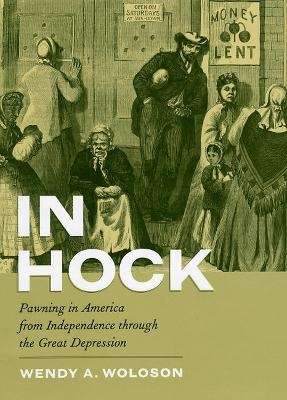
In Hock
Pawning in America from Independence through the Great Depression
Seiten
2010
University of Chicago Press (Verlag)
978-0-226-90567-9 (ISBN)
University of Chicago Press (Verlag)
978-0-226-90567-9 (ISBN)
- Titel z.Zt. nicht lieferbar
- Versandkostenfrei innerhalb Deutschlands
- Auch auf Rechnung
- Verfügbarkeit in der Filiale vor Ort prüfen
- Artikel merken
Reveals that pawnshops have long played an integral role in Americans' economic lives. Presenting the history of pawn-broking in the United States from the nation's founding through the Great Depression, this title demonstrates that the practice was inextricably intertwined with the rise of capitalism.
Puncturing the myth of the seamy storefront stocked with stolen watches and overseen by a shifty proprietor, "In Hock" reveals that pawnshops have long played an integral role in Americans' economic lives. The definitive history of pawn-broking in the United States from the nation's founding through the Great Depression, this volume demonstrates that the practice was inextricably intertwined with the rise of capitalism. The class of working poor begotten by this economic tide could make ends meet, Wendy A. Woloson argues, only by regularly visiting pawnshops to supplement their inadequate wages. Nonetheless, businessmen, reformers, and cultural critics berated the shops for promoting vice and used anti-Semitic stereotypes to cast their proprietors as greedy and cold-hearted. Parsing and subverting these caricatures, Woloson shows that pawnbrokers were in fact shrewd businessmen, often from humble origins, who honed sophisticated knowledge of a wide range of goods and their values in different markets.
In the process, she paints a resonant portrait of the generations of Americans whose struggle for economic survival often depended on an institution that has remained, until now, woefully misunderstood.
Puncturing the myth of the seamy storefront stocked with stolen watches and overseen by a shifty proprietor, "In Hock" reveals that pawnshops have long played an integral role in Americans' economic lives. The definitive history of pawn-broking in the United States from the nation's founding through the Great Depression, this volume demonstrates that the practice was inextricably intertwined with the rise of capitalism. The class of working poor begotten by this economic tide could make ends meet, Wendy A. Woloson argues, only by regularly visiting pawnshops to supplement their inadequate wages. Nonetheless, businessmen, reformers, and cultural critics berated the shops for promoting vice and used anti-Semitic stereotypes to cast their proprietors as greedy and cold-hearted. Parsing and subverting these caricatures, Woloson shows that pawnbrokers were in fact shrewd businessmen, often from humble origins, who honed sophisticated knowledge of a wide range of goods and their values in different markets.
In the process, she paints a resonant portrait of the generations of Americans whose struggle for economic survival often depended on an institution that has remained, until now, woefully misunderstood.
Wendy A. Woloson is an independent scholar and consulting historian living in Philadelphia. She is the author of Refined Tastes: Sugar, Consumers, and Confectionery in Nineteenth-Century American Culture.
| Erscheint lt. Verlag | 30.4.2010 |
|---|---|
| Sprache | englisch |
| Maße | 15 x 23 mm |
| Gewicht | 482 g |
| Themenwelt | Geschichte ► Teilgebiete der Geschichte ► Kulturgeschichte |
| Geschichte ► Teilgebiete der Geschichte ► Wirtschaftsgeschichte | |
| Betriebswirtschaft / Management ► Spezielle Betriebswirtschaftslehre ► Bankbetriebslehre | |
| ISBN-10 | 0-226-90567-5 / 0226905675 |
| ISBN-13 | 978-0-226-90567-9 / 9780226905679 |
| Zustand | Neuware |
| Informationen gemäß Produktsicherheitsverordnung (GPSR) | |
| Haben Sie eine Frage zum Produkt? |
Mehr entdecken
aus dem Bereich
aus dem Bereich
der stille Abschied vom bäuerlichen Leben in Deutschland
Buch | Hardcover (2023)
C.H.Beck (Verlag)
23,00 €
vom Mittelalter bis zur Gegenwart
Buch | Softcover (2024)
C.H.Beck (Verlag)
12,00 €


